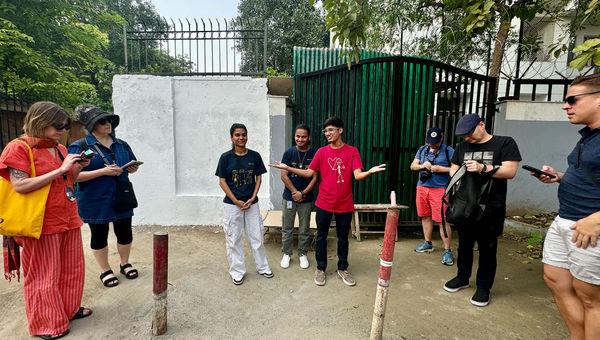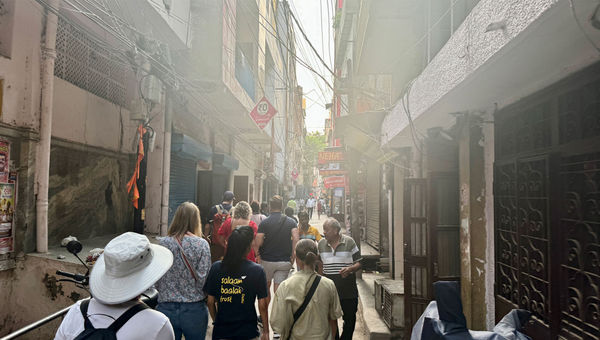JAIPUR, India — When I first arrived in India’s capital, New Delhi, I had a burning question: Where were all the women?
When I traveled with the G Adventures press group, I felt a little intimidated by the crowds that filled the street corners, alleys, shops and restaurants around the New Delhi railway station, and there were not many of them. There are hardly any women in sight.
Our group was walking tour The event is hosted by local community tourism organization Salaam Baalak Trust and supported by Planetra, the not-for-profit arm of the adventure tour operator. This is one of the projects the company is touring India’s “Golden Triangle” of New Delhi, Agra and Jaipur in the days leading up to the second annual GX Summit.
The Salam Barak Trust supports, shelters and educates India’s street children through tourism initiatives and partnerships, while raising awareness of the circumstances that force children to live on the streets. Its efforts aim to provide safe homes, education, and ultimately employment.
During our walk, my questions about the absence of women were partially answered.
Our three guides, Jafar, Kadjal and Salman, explained that homeless boys tend to be brought into Salaam Baalak’s projects because they are easier to spot in public places, where they can often be seen for sale online. Goods – sometimes illegal goods. street. However, girls are harder to find and help because they live on the streets and are often in hiding, requiring extra precautions to protect themselves. Sometimes, street girls are forced to seek refuge in brothels, making finding them even more difficult.

Salaam Baalak Trust tour guides (centre, left to right): Kadjal, Jafar and Salman. Photo credit: Nicole Ednedo
Later this week, Meenu Vadera, founder of the Azad Foundation and its women-led transportation service Women With Wheels in New Delhi, will answer my questions in full. During a panel discussion at the GX Summit about empowering women in community tourism businesses, she said others had also asked about the lack of women in public spaces; it was a common question her organization raised when hosting first-time visitors to the city question.
“India is a highly gendered society with very strict gender roles; there is no doubt that a woman’s place should be within the four walls of the home,” she said.
Vadra told attendees that this was partly what led her to found the Azad Foundation and Women With Wheels in 2008. She hopes to provide Indian women with a dignified livelihood and help them seek independence and explore lives outside of tradition. Gender norms.
Vadra said that by training women to become drivers, the Azad Foundation “breaks down the concrete walls around women and puts them on the road to become active citizens of the world”. She noted that Women on Wheels is currently operating in several countries, including Germany and France.
“They don’t just make money. They don’t just become powerful women. They learn to take control of their jobs, their lives and their bodies,” she said.

Salam Barak Trust Walking Tour, New Delhi. Photo credit: Nicole Ednedo
Women lead the way
The focus on women takes center stage again as G Adventures launches its female-powered sustainability program and its new products. Solo travel collection The project will launch in 2025 and will be led by female guides. The message seems to be: women not only have a role to play in the future of travel, but they play an important role in the future of travel. They are the future of travel.
Bruce Poon Tip, Chairman and Founder of G Adventures said, “63% of the people working in the travel industry are women and 65% of the people who take our trips are women. Look at solo travel, look at couples travel. Women decide the travel. way.” [plans] 85% of couples. Women are definitely the drivers of the tourism economy. “
Just days before the GX Summit, held on World Community Tourism Day, some 400 travel professionals – suppliers, travel consultants and media – took part in an itinerary that included a visit to a women-led travel project supported by Planetra.
Awareness of violence against women in India, particularly in the form of acid attacks, was highlighted during a visit to the Sheroes Hangout in Agra, where female survivors of these attacks run a cafe and cultural center. Most of these survivors are disfigured and face discrimination, which makes it difficult for them to find work.
Thanks to the Sheroes Hangout, they can work in a safe environment, rebuild their lives, and advocate for stricter laws and protections for women.
In Jaipur, women entrepreneurs can get a safe space to sell their handmade goods and services while learning financial independence skills at Anoothi India, a women-led social enterprise. G Adventures travelers can participate in craft making and purchase locally sourced products at a pop-up market set up by Anoothi.
The goal of this year’s GX Summit is simple: to demonstrate how community tourism not only helps educate, employ and empower women, but also how investing in women-led tourism initiatives can move the industry forward towards sustainable and responsible tourism goals.
“There’s a lot of data that shows that when you educate women, when you educate girls, everything gets better: communities are stronger, more vibrant, more successful,” Pan-Tip said.
Source link

